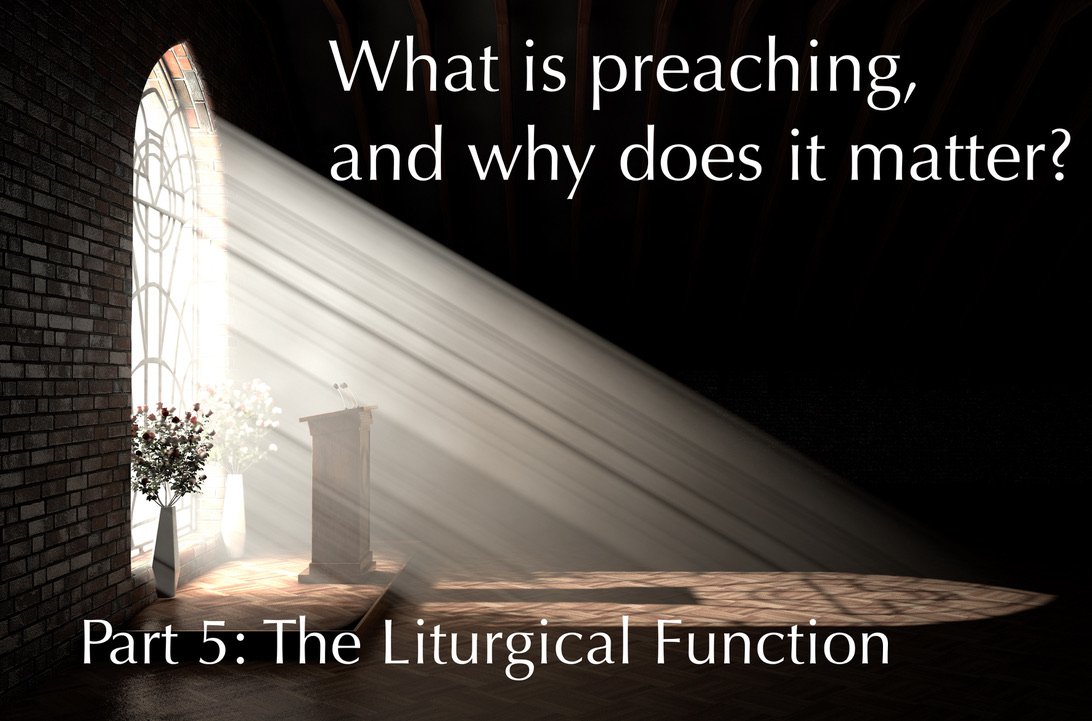Preaching Exalts God
The Chief End of the Sermon
The first question in the Westminster Shorter Catechism cuts straight to the most essential point of humanity’s existence: “What is the chief end of man?” We preachers might ask the same question of our task: “What is the chief end of the sermon?” May I suggest that the answer to both questions is the same? “To glorify God and enjoy him forever!”
At the core of preaching’s purpose is its liturgical function – and not just because most sermons happen in the context of a worship service. The catechism’s second question is, “What rule hath God given to direct us how we may glorify and enjoy him?” The answer is, “The Word of God.” To proclaim God’s word is to call God’s people to worship.
This doesn’t mean simply that worship is the most important application point in the sermon. It means that worship fuels every application point in the sermon. The ultimate and highest goal of preaching is that hearers walk away from the sermon filled with wonder, awe, and joyful delight in God. When this happens, all application becomes spontaneous response rather than dutiful obedience or moralistic burden.
Beyond “Attributes”
The next question in a catechism for preachers might be, “How can a sermon lead people to glorify and enjoy God?” Preachers of a more systematic bent than I might immediately jump to a sermon series on the “attributes of God” – that list of philosophical concepts first introduced by the Greek Fathers, and then developed, augmented, redefined, and categorized through generations of theologians in every era. In keeping with the principle that the rule for glorifying and enjoying God is found in his word (Old and New Testaments), I would suggest the better path is simply to let God’s word speak, in whatever way it speaks in a given text, with an ear for allowing the Scriptures to introduce us to God in a fresh way each time we open them.
Israel’s highest moments of worship were in those special times when God “showed up” in a dramatic way. The sea parted. The fire fell on the mountain. The tabernacle filled with holy fire. His glory shook the temple. These moments were few and far between, occasional punctuations of wonder amid an endless and bloody cycle of slaughtered animals and burnt offerings. The Israelites built monuments and told stories to pass these experiences of God from generation to generation.
With the New Testament comes a new paradigm of God’s presence among his children. The Lamb of God has born the sins of the world. The Holy Spirit has indwelt his people to guide them into all truth, convict them of sin, righteous, and judgement – and to bring his word to life with transforming power. In this season between the times there is the very real possibility of God “showing up” every day. Worship is not a repeated ritual, but a dynamic response to powerful encounter with God in his word.
For this reason, Christian preaching that leads to worship is not a talk about God in which we describe him, discuss him, and define him through proof-texted topics. The task of preaching is to lead God’s people to a divine encounter in his word – in whatever way a particular portion of Scripture presents him.
Divine Encounter through the Scriptures
In Old Testament narrative we encounter God the Father as creator and sustainer of the cosmos. He is also the one who calls and creates a people for himself. He delivers his people, leads them, feeds them, reveals himself to them, and give them a home. He even disciplines them, judges them, and restores them.
In OT poetry we find God in the deeply personal struggles of individuals and communities clinging to what they know of God and finding comfort and hope in their darkest days as well as joyful delight in their happiest days. We also meet God as wisdom personified, speaking eternal truth into the day-to-day living of life.
In the Gospels we meet Jesus, the eternal Son. He is teacher, healer, rebuker of demons, and master of wind and waves. He lifts up the weak and vulnerable and puts the high and mighty in their place. He sustains a wedding feast with new wine and feeds a hungry crowd. He is suffering servant, sacrificial lamb, and resurrected lord. He reigns as lord of all, anticipating a triumphant and glorious return.
In the epistles, men guided by the Holy Spirit wrestle to understand the full significance of all that God has done in Christ and how it impacts the specific settings and problems they face. Periodically, in moments of breakthrough and discovery, they spontaneously erupt in doxologies of praise to God for his unfathomable gifts.
Might this pattern of exposition and worship be our template for the liturgical function of preaching? A preacher and congregation, opening the Scriptures in God’s presence experience him in a fresh way as he speaks by his Spirit through his word to the specific need of the moment. Preacher and hearers alike respond with a heartfelt “thanks be to God!” God’s people worship in spirit and truth, not because they have gained some new insight about God, but because they have met him, and in his presence they are filled with holy delight.
Preaching matters because every time a preacher stands before God’s people to proclaim his word there is the expectation of divine encounter which will lead the people to fulfill their highest end – to glorify God and enjoy him forever. When this happens, preacher and sermon have also fulfilled their highest end. The sermon was not just a message delivered to a congregation, but an offering presented in worship to God.


